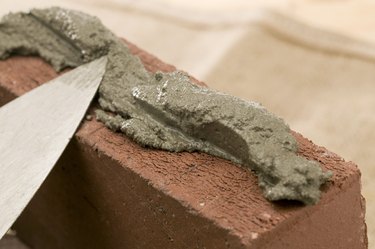
Mortar, a key ingredient in masonry construction, is traditionally made by combining water with three constituents: Portland cement, hydrated lime and sand. Although altering the proportions of each of these provides a range of strength and other characteristics, traditional mortar has some disadvantages. Mortar with polymeric admixtures can be utilized advantageously and economically in certain circumstances.
Basics and Purpose
Video of the Day
Polymer-modified mortar is made by replacing a portion of the traditional binders with polymers. Polymers are added to mortar to increase characteristics that may include adhesion, toughness, flexural or tensile strength, and resistance to chemicals. Polymers act to improve the workability and adhesion of nonhardened mortar and often require less added water than does traditional mortar, which results in fewer pores and stronger cements, subsequently reducing water ingress and permeability to salts.
Video of the Day
Types of Polymers
Polymer-modified mortar is often commercially available with all ingredients already included in the mixture. Otherwise, polymer additives, which can be divided into classes, are added to mortar mix. Redispersible polymer powders such as ethylene vinyl acetate are usually added to dry mortar mix. Water-soluble polymers such as polyvinyl alcohol are also powders but are added to wet mortar mix. Aqueous latex suspensions involve latex particles suspended in water that are able to coat hydrating cement particles. Finally, liquid polymers like epoxy resins or unsaturated polyesters are added during mixing to create a network of cemented polymer hydrate, increasing the strength of the mixture.
Usage
Polymer-modified mortar is utilized in a range of mortar and concrete repair and primary construction applications. Reduced water and salt ingress makes polymer-modified mortar ideal for masonry exposed to weathering and other exterior conditions. Polymer-modified thinset mortar is design to adhere tile to concrete and cement board substrates without needing to soak the tiles beforehand. Polymer-modified mortars are widely used for repair purposes because of their minimized shrinkage and ability to bond with even dense surfaces.
Additional Possible Admixtures
In addition to polymers, other types of materials are regularly added to mortars to achieve desired characteristics. Color pigments can sometimes be added to mortar to alter the mortar's appearance. Accelerators and retarders, when added, work to reduce or increase the length of time the mortar requires to cure, an important trait to manipulate in extremely cold or warm, humid weather. Other mortar additives include mineral additions, such as silica fume, aggregates and inert fillers, plasticizing chemical admixtures and fibers to help control shrinkage.